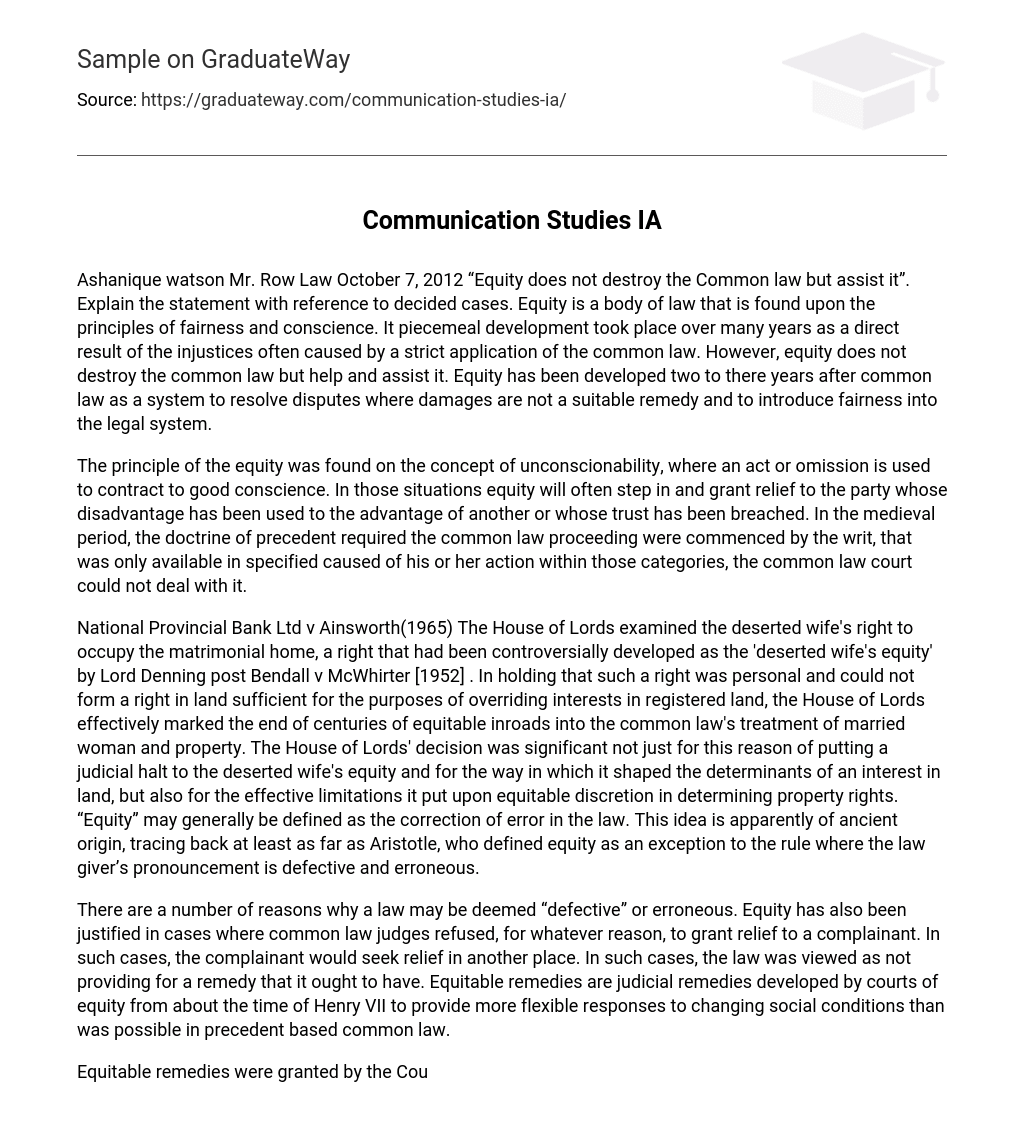Ashanique watson Mr. Row Law October 7, 2012 “Equity does not destroy the Common law but assist it”. Explain the statement with reference to decided cases. Equity is a body of law that is found upon the principles of fairness and conscience. It piecemeal development took place over many years as a direct result of the injustices often caused by a strict application of the common law. However, equity does not destroy the common law but help and assist it. Equity has been developed two to there years after common law as a system to resolve disputes where damages are not a suitable remedy and to introduce fairness into the legal system.
The principle of the equity was found on the concept of unconscionability, where an act or omission is used to contract to good conscience. In those situations equity will often step in and grant relief to the party whose disadvantage has been used to the advantage of another or whose trust has been breached. In the medieval period, the doctrine of precedent required the common law proceeding were commenced by the writ, that was only available in specified caused of his or her action within those categories, the common law court could not deal with it.
National Provincial Bank Ltd v Ainsworth(1965) The House of Lords examined the deserted wife’s right to occupy the matrimonial home, a right that had been controversially developed as the ‘deserted wife’s equity’ by Lord Denning post Bendall v McWhirter [1952] . In holding that such a right was personal and could not form a right in land sufficient for the purposes of overriding interests in registered land, the House of Lords effectively marked the end of centuries of equitable inroads into the common law’s treatment of married woman and property. The House of Lords’ decision was significant not just for this reason of putting a judicial halt to the deserted wife’s equity and for the way in which it shaped the determinants of an interest in land, but also for the effective limitations it put upon equitable discretion in determining property rights. “Equity” may generally be defined as the correction of error in the law. This idea is apparently of ancient origin, tracing back at least as far as Aristotle, who defined equity as an exception to the rule where the law giver’s pronouncement is defective and erroneous.
There are a number of reasons why a law may be deemed “defective” or erroneous. Equity has also been justified in cases where common law judges refused, for whatever reason, to grant relief to a complainant. In such cases, the complainant would seek relief in another place. In such cases, the law was viewed as not providing for a remedy that it ought to have. Equitable remedies are judicial remedies developed by courts of equity from about the time of Henry VII to provide more flexible responses to changing social conditions than was possible in precedent based common law.
Equitable remedies were granted by the Court of Chancery in England, and remain available today in most common law jurisdictions. In many jurisdictions, legal and equitable remedies have been merged and a single court can issue either-or both remedies. The two main equitable remedies are injunctions and specific performance, and in casual legal parlance references to equitable remedies are often expressed as referring to those two remedies alone. Equitable maxims are both substantive and procedural; Courts use the maxims in one or two ways: enabling or restrictive.
Enabling pertain to the subject of equitable jurisdiction and the granting of relief while courts do refer to specific maxims as often as courts in the past, but the equitable maximums help in analysis of issues and in predicting the outcome of a case. Common Equitable Maxims includes; He who seeks equity must do equity. Equity will not enforce an unconscionable contract; it is not an avenger at large. Equity aids the vigilant, not those who slumber on their rights. It acts in person and follows the law.
Equity delights to justice and not by halves, will not suffer a wrong to be without a remedy and regards substance rather than form. Equity imputes intent to fulfill an obligation. In conclusion Equity implies giving as much advantage, consideration, or latitude to one party as it is given to another. Along with economy, effectiveness, and efficiency, Equity is essential for ensuring that extent and costs of funds, goods and services are fairly divided among their recipients. According to cases Ramsden v Dyson (1886) the quality of being fair and impartial, “It’s equity of treatment”.





